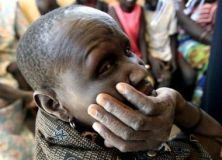UN to repatriate 60,000 refugees to South Sudan by May
Dec 19, 2005 (NAIROBI) — The U.N. refugee agency will repatriate about 60,000 refugees to southern Sudan by May, following a peace deal earlier in the year that has made it easier for them to return home, a senior U.N. official said Monday.
 The move started Saturday and it could take up to five years to repatriate all 560,000 southern Sudanese refugees in seven neighboring countries — Central African Republic, Congo, Egypt, Eritrea, Ethiopia, Kenya and Uganda — said Jean-Marie Fakhouri, the head of operations in Sudan for the U.N. High Commissioner for Refugees.
The move started Saturday and it could take up to five years to repatriate all 560,000 southern Sudanese refugees in seven neighboring countries — Central African Republic, Congo, Egypt, Eritrea, Ethiopia, Kenya and Uganda — said Jean-Marie Fakhouri, the head of operations in Sudan for the U.N. High Commissioner for Refugees.
All the refugees will be repatriated voluntarily from camps and settlements they have lived in for as long as 15 years.
Many of the refugees’ homes were destroyed in the war between rebels and the Arab-dominated government in the country’s north. There are few hospitals or schools in southern Sudan, and the region lacks basic infrastructure such as running water and electricity.
“It is going to be many years before anyone can say the (living) conditions (in southern Sudan) are the same to what they (refugees) have enjoyed in asylum,” Fakhouri told journalists.
The agency is ensuring that the areas the southern Sudanese refugees will return to have some basic things such as a school, wells and a health facility, he said.
“We hope that we should be able to do it (the repatriation of all refugees) within 3 to 5 years,” said Fakhouri.
The first 131 refugees — not 147 as earlier reported — were repatriated by the UNHCR Saturday to Kapoeta in Sudan’s Eastern Equatoria state and Bor in Upper Nile state, from their camp in northwestern Kenya.
When the rainy season starts in May, the repatriation will stop because southern Sudan has only 14 kilometers (8.7 miles) of paved road, making it difficult to move people, Fakhouri said.
The war in southern Sudan began with fighting that broke out in 1983. Over 2 million people died in the war, mainly due to conflict-induced famine.
In January, the Sudanese government and the main southern rebel group reached a deal to end the conflict.
The north-south peace agreement provides for an autonomous south with its own army, government and a new constitution during a six-year interim period. After the transition, the 10 southern states will hold a referendum on independence.
(AP/ST)
